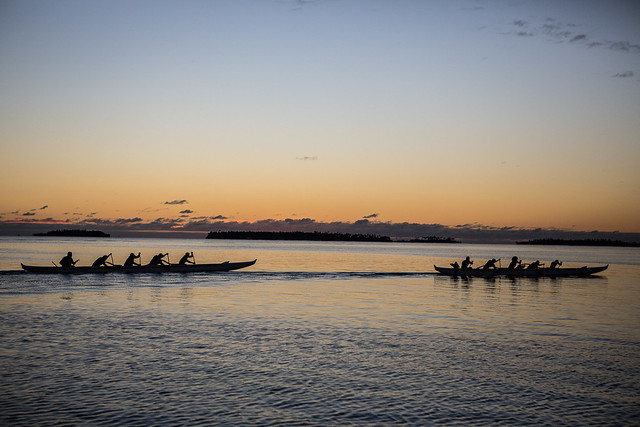The destiny and duty of the Pacific pivot
Posted By Graeme Dobell on May 6, 2019 @ 06:00

Australia’s new South Pacific policy is set in place, no matter which side wins the election on 18 May.
Labor and the Coalition entered the election with a unity ticket on Papua New Guinea, the Pacific islands and Timor-Leste that ASPI calls the Pacific pivot.
The policy consensus draws on Australian ideas about destiny, duty, denial and desire.
Destiny refers to an obsession with the island arc that helped create the Commonwealth in 1901, and the South Pacific’s special place in Australia’s constitution.
Duty reflects the security guarantee Australia offers the islands, and Canberra’s determination to be the region’s ‘principal security partner’.
Denial describes Australia’s instinct of strategic denial in the South Pacific. The China challenge [1] has reawakened Australia’s fear of external powers gaining a hold in the islands.
Desire is what Australia, and New Zealand, want to do with the South Pacific, the ambitious offer of economic and security ‘integration’ to uphold the region by holding it closer.
Those thoughts are explored in my new ASPI special report: Australia’s Pacific pivot: destiny, duty, denial and desire [2].
The report looks closely at how Australia’s instinct of strategic denial in the island arc has been roused by the challenge from China. As a companion or counterpoint to the challenge perspective, see Richard Herr’s special report on Chinese influence in the Pacific islands [3].
Date the pivot from the Coalition government’s 2017 foreign policy white paper [4], which promised ‘more ambitious engagement’ and offered the new vision ‘to integrate Pacific countries into the Australian and New Zealand economies and our security institutions’. Integration is described as ‘essential to the long-term stability and economic prospects of the Pacific’, a region of ‘fundamental importance to Australia’.
Integration is a confronting idea for the identity and independence of proud island nations. That’s why Prime Minister Scott Morrison has shown political and diplomatic smarts by talking often about Australia as part of the ‘Pacific family [5]’.
The family imagining offers much, not least a lens to widen Australia’s understanding of the pivot’s two dimensions: power and people.
Power is about Australian policy—diplomatic, defence, trade, aid, business [6], communications and international broadcasting [7]—driven by our strategic denial instinct. The power questions for Australia are about our interests and influence, but also about our values.
The people dimension is about our values meeting the values and needs of the diverse members of the South Pacific family.
Family is the badge for the pivot, complementing New Zealand’s Pacific ‘reset’ [8]. It’s an explanation of belonging and responsibility—an imagining that offers more equality than talk of ‘our patch’ or ‘our backyard’.
The South Pacific hasn’t shown much enthusiasm for integration. The anti-Oz line is that integration is colonialism redux—a polite term for dominance—and that Canberra’s focus is all about China, not the islands.
The family discussion gets a warmer response, although, as in any family, the disagreements wound. Australia’s stance on climate change and the ‘Pacific solution’ of sending boat people to Nauru and Manus Island eat away at our standing.
Canberra can’t assume that its good intentions are automatically accepted. The Oz hegemon isn’t always benign—we have form as a selfish bully.
Integration is a good idea that’ll gain ground slowly and that’s subject to how we act more than what we say. Integration asks the South Pacific to compromise a level of sovereignty—to trust and benefit from Australia’s economic and security opportunities and leadership.
Integration rests on a simple, obvious idea: a stronger South Pacific is in Australia’s interests. Stronger island nations are better able to serve their own interests and identities. It’s not contradictory to say that those South Pacific interests and identities will be helped by getting closer to Australia and New Zealand.
Independence is based on strength, not weakness. The integration offer is about helping the islands build their future, not binding their options.
In talking up integration, I’ve been struck by how my strongest line hasn’t been Australia’s good intentions but the example of New Zealand.
New Zealand will be central in setting the ambition and the limits of integration. Wellington must play the special role it claims for itself in the Pacific as the essential Kiwi.
New Zealand knows all the benefits of alliance with Australia, and free movement of goods, services and people. New Zealand has been integrating with Australia for 200 years, yet this embrace of the kangaroo has never hurt Kiwi identity or sovereignty (or changed the way they do their vowels).
New Zealand is proudly itself, while prospering from the kangaroo partnership. The Kiwi integration experience is a positive model for a Pacific community. If the Kiwis can do it, so can the rest of the South Pacific.
Responding to all the economic, social and security needs of the South Pacific, the pivot rests on a renewed political consensus in Canberra—plus the help and example of the essential Kiwi.
Article printed from The Strategist: https://www.aspistrategist.org.au
URL to article: https://www.aspistrategist.org.au/the-destiny-and-duty-of-the-pacific-pivot/
URLs in this post:
[1] China challenge: https://www.aspistrategist.org.au/china-challenges-australia-in-the-south-pacific/
[2] Australia’s Pacific pivot: destiny, duty, denial and desire: https://s3-ap-southeast-2.amazonaws.com/ad-aspi/2019-04/SR%20139%20Australias%20Pacific%20pivot.pdf?cb_hSayz2XJqn_rWimYIi0jxc0udDc9P
[3] Chinese influence in the Pacific islands: https://www.aspi.org.au/report/chinese-influence-pacific-islands
[4] foreign policy white paper: https://www.fpwhitepaper.gov.au/
[5] Pacific family: https://www.aspistrategist.org.au/imagining-australias-south-pacific-family/
[6] business: https://www.aspistrategist.org.au/businesses-can-help-australias-step-up-in-the-pacific/
[7] international broadcasting: https://www.aspi.org.au/event/hard-news-and-free-media-sharp-edge-australian-soft-power
[8] ‘reset’: https://www.lowyinstitute.org/publications/winston-peters-new-zealand-pacific
Click here to print.